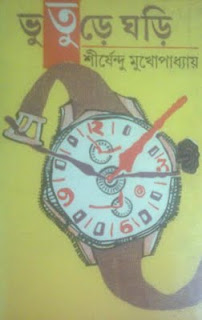The second volume in the series contains three stories, one adapted from
Gardner’s novel and  the other two from that of Agatha Christie. These
Indianised versions are nicely woven with the suspense kept alive till the very
last chapters but the first two Uler
K(n)aata and A-Aa-Kaw Khuner K(n)aata
seemed to have ended very hurriedly and not at all like the third one Sarmeya Genduker K(n)aata. The way the
first two plots unfold and the way the climaxes are reached are quite at
different paces in the first and the second pieces.
the other two from that of Agatha Christie. These
Indianised versions are nicely woven with the suspense kept alive till the very
last chapters but the first two Uler
K(n)aata and A-Aa-Kaw Khuner K(n)aata
seemed to have ended very hurriedly and not at all like the third one Sarmeya Genduker K(n)aata. The way the
first two plots unfold and the way the climaxes are reached are quite at
different paces in the first and the second pieces.
 the other two from that of Agatha Christie. These
Indianised versions are nicely woven with the suspense kept alive till the very
last chapters but the first two Uler
K(n)aata and A-Aa-Kaw Khuner K(n)aata
seemed to have ended very hurriedly and not at all like the third one Sarmeya Genduker K(n)aata. The way the
first two plots unfold and the way the climaxes are reached are quite at
different paces in the first and the second pieces.
the other two from that of Agatha Christie. These
Indianised versions are nicely woven with the suspense kept alive till the very
last chapters but the first two Uler
K(n)aata and A-Aa-Kaw Khuner K(n)aata
seemed to have ended very hurriedly and not at all like the third one Sarmeya Genduker K(n)aata. The way the
first two plots unfold and the way the climaxes are reached are quite at
different paces in the first and the second pieces.
Keeping the sleuthing and adventure part aside,
which are of course as good as the originals and also the erudition of the
narratives, there are certain features that are irritatingly monotonous. The
writer, being and Engineering graduate and a quality scholar could not resist
the temptation of using analogies that may only be appreciated by a few and
this may exclude the most ardent lover of mystery. Without compromising on the
mystery that may have been made more and more complex, if required, the writing
could have been more easily refined. Secondly is the use of too much flowery
language that shifts the interest to literature rather than mystery. Thirdly is
some undue use of humour at places that again lightens up the thrill of the
adventures. Finally but more importantly is the tendency of creating a British
ambience everywhere. Starting from referring the mere elderly individuals as
‘Saheb’ to focusing on breakfast habits, after dinner drinks and finally making
an entire story based on a Christian town - the basic idea of presenting an
Indianised detective version of the Western counterparts, that the author
stressed upon in the earlier volume, seems to vanish completely. The romance which
is due to any detective story, here seems to be more artificially generated
than that which naturally evolves in this genre. The characters are different
as regard profession but the same sense of humour in most actually robs the
narrative of reliefs. The characters seem only to differ in their sense of
responsibility and intellect. Most of the individuals show the same degree of
refined schooling. Also there is an aggressive use of historical accounts
whenever a scope presents itself. Sharing of facts no doubt enriches knowledge
but irrelevant sharing mars the actual reading. Let’s see what the other volumes
have in store!



















